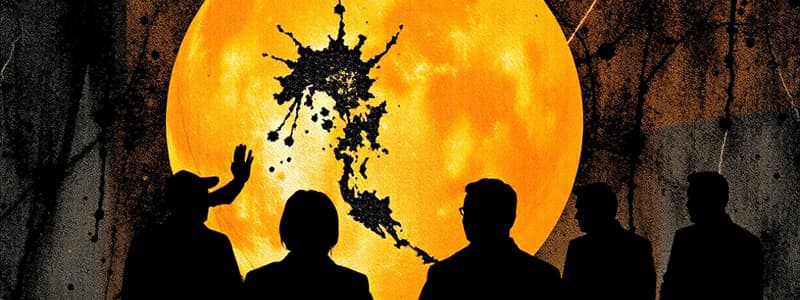Podcast
Questions and Answers
What is the primary aim of problem-solving theory?
What is the primary aim of problem-solving theory?
- To encourage broad systemic changes in societal norms
- To question existing social structures
- To propose theoretical alternatives to current institutions
- To address and resolve specific issues within existing systems (correct)
How does critical theory differ from problem-solving theory?
How does critical theory differ from problem-solving theory?
- It aims for practical solutions rather than understanding change.
- It examines historical processes affecting social relationships. (correct)
- It focuses on fragmented individual activities instead of larger connections.
- It assumes a stable order while questioning foundational structures.
Which perspective tends to favor problem-solving approaches?
Which perspective tends to favor problem-solving approaches?
- Times of uncertainty
- Periods of rapid evolution
- Periods of stability (correct)
- Periods of change
What does critical theory aim to achieve?
What does critical theory aim to achieve?
What challenge does problem-solving theory face regarding its claim of being value-free?
What challenge does problem-solving theory face regarding its claim of being value-free?
Which of the following best describes the focus of problem-solving theory?
Which of the following best describes the focus of problem-solving theory?
What role does theory play according to the discussed perspectives?
What role does theory play according to the discussed perspectives?
Which statement accurately reflects a characteristic of critical theory?
Which statement accurately reflects a characteristic of critical theory?
What is an important aspect of critical theory as defined in the content?
What is an important aspect of critical theory as defined in the content?
What can be inferred about the relationship between problem-solving theory and critical theory?
What can be inferred about the relationship between problem-solving theory and critical theory?
Flashcards
Theories and Perspective
Theories and Perspective
Theories are created within a specific time and place, influenced by factors like social class, political climate, and personal experiences.
Transcending Perspective
Transcending Perspective
Sophisticated theories acknowledge their own unique perspectives, but also strive to transcend these limitations.
Theories and World Problems
Theories and World Problems
Theories are tools for understanding problems in the world and finding solutions.
Problem-Solving Theory
Problem-Solving Theory
Signup and view all the flashcards
Critical Theory
Critical Theory
Signup and view all the flashcards
Critical Theory vs. Problem-Solving
Critical Theory vs. Problem-Solving
Signup and view all the flashcards
Scope and Focus
Scope and Focus
Signup and view all the flashcards
Solutions and Alternatives
Solutions and Alternatives
Signup and view all the flashcards
Value-Free Claims
Value-Free Claims
Signup and view all the flashcards
Theory and Historical Periods
Theory and Historical Periods
Signup and view all the flashcards
Study Notes
Perspectives and Purposes of Theory
- Theory is always tied to a specific perspective in time and space (social, political, power dynamics).
- Perspectives are influenced by factors like nation, social class, power dynamics, historical experiences, and expectations of the future.
- Sophisticated theory reflects upon and goes beyond its initial perspective, but the initial perspective is always part of the theory.
- Theory isn't independent from standpoints in time and space; it's crucial to examine it as ideology.
- Theory's primary role is to understand complex issues posed by social reality.
- Theory adapts to evolving reality, adjusting or discarding old concepts and crafting new ones through dialogue between theorists and the world being studied.
- Theory initially responds to problems within a specific perspective.
- It also reflects on the theory-making process itself.
- Two distinct purposes of theory: solving existing problems and creating alternative possibilities.
Problem-Solving Theory
- Aims to improve existing relationships and institutions smoothly.
- Focuses on specific problems within specific areas, assuming relative stability in other areas.
- Employs delimited parameters and variables to find solutions.
- Relies on the "ceteris paribus" (other things being equal) assumption for general validity.
- This approach is focused on the existing structure and aims to maintain the status quo.
Critical Theory
- Questions the existing social/political order to understand its origins and potential change .
- It considers the broader historical and social contexts to understand problems.
- Focuses on understanding larger social structures and power dynamics, rather than just specific issues.
- Aims to envision alternative possibilities of change.
- It acknowledges that social and political orders can change.
- A major difference from problem-solving theory is the rejection of the assumption of a fixed social order.
- Theory should lead to practice and guide strategic actions.
- Useful for understanding and addressing deep-rooted problems in society.
Value-Free Claim and Historical Context
- Problem-solving theory often claims to be value-free by separating variables studied, but the framework accepted by theory is inevitably value-laden.
- Critical theory acknowledges the inevitable value judgments embedded in all perspectives.
- The usefulness of a theory can be judged by it's historical context.
- The usefulness of a theory can be linked to the period it was created and the prevailing social and political order at that time.
Studying That Suits You
Use AI to generate personalized quizzes and flashcards to suit your learning preferences.




